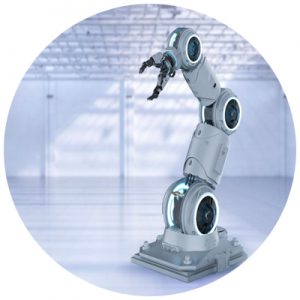A major new research project is harnessing a diverse range of disciplines to examine how technologists can learn from people with disabilities and support them in the future.
Led by the University of Leeds, Imagining Technologies for Disability Futures will for the first time bring together expertise in arts and humanities, design, engineering and robotics to increase understanding of how disability is currently represented, and ways in which technology can enhance lives in the future.
Funded with a flagship Wellcome Trust Collaborative Award in Humanities and Social Sciences, the £1.5m five-year project will begin in January 2020. A variety of disability groups across the UK will be closely involved in shaping the project, which includes researchers from the universities of Sheffield, Dundee and Exeter and international partners in the USA, Japan and Sweden.
Principal Investigator Professor Stuart Murray said, “From care and companionship robots to sophisticated assistive speech technology systems, well-designed technology that fully takes account of users’ needs can be a great force for positive change. This is a unique project, bringing together researchers across the world from very different backgrounds. Our aim is to better understand how disability and technology interact and how that interaction could develop in the future, with an ever-increasing rate of technological change.”
Professor Murray, who is Director of Leeds’ Centre for Medical Humanities, added, “Our research will not only produce new ideas about how disability is seen in a world where artificial intelligence and robotics will affect how we all live, it will also create new technologies that can be used by people with disabilities today.”
Project partners will also make films, design exhibitions, participate in arts festivals and showcase their work at technology fairs in the UK and abroad.
Academic expertise will include literary and cultural studies, medical humanities and philosophy, disability design, production engineering and robotics.
At Leeds, colleagues of Professor Murray in the schools of English (Dr. Amelia DeFalco) and Mechanical Engineering (Dr. Raymond Holt) are co-investigators.
The project, the first funded by Wellcome at Leeds through the Collaborative Award scheme, draws together several of the University’s research and innovation strengths, including medical humanities, health care technologies and robotics.
An English Studies critical approach will investigate how society tells stories about disability and technology and the ways in which they are represented in literature and film. It will explore how bodies are imagined in the future, for example in science fiction, and how this resonates with people with disabilities today.
Research at the University of Sheffield will be led by Professor Tony Prescott and colleagues in Sheffield Robotics and the University’s Department of Computer Science. The team will conduct participatory design activities with children and older adults with disabilities with the aim of co-designing and prototyping next generation assistive technologies.
 An important focus will be on animal-like companion robots that could operate to reduce anxiety in children in a hospital setting, and on telepresence robots that could allow older users to act or interact at a distance by remotely controlling a robot. In addition to the project partners, the Sheffield group will lead on work with Sheffield Children’s NHS Foundation Trust, with researchers at Carnegie Mellon University in the USA and Kyushu Institute of Technology in Japan, and with the University of Sheffield spin-out company Consequential Robotics.
An important focus will be on animal-like companion robots that could operate to reduce anxiety in children in a hospital setting, and on telepresence robots that could allow older users to act or interact at a distance by remotely controlling a robot. In addition to the project partners, the Sheffield group will lead on work with Sheffield Children’s NHS Foundation Trust, with researchers at Carnegie Mellon University in the USA and Kyushu Institute of Technology in Japan, and with the University of Sheffield spin-out company Consequential Robotics.
Professor Prescott said, “We are excited to work with researchers from the medical humanities to understand how culture influences the ways in which people relate to, and use, different kinds of robot technology in real-world contexts such as classrooms, hospital wards and people’s homes. Our aim in this project is to work closely with people with disabilities in order to understand how assistive robots could help them and to design new kinds of assistive robot technologies that they find appealing and useable.”
Meanwhile in Dundee, Dr. Graham Pullin, a researcher in disability-led design at Dundee’s Duncan of Jordanstone College of Art & Design, will lead a team exploring alternative futures for assistive communication technologies, again drawing on cultural imaginings as well as lived experiences.
The team will build, exhibit and share early prototypes, the role of which will be to provoke reflection and debate about assistive technology and disability design.
Dr. Pullin said, “We will be challenging the assumption that future augmented communication will inevitably ‘disappear’ into people’s bodies. The futures we will prototype will be neither utopian nor dystopian, but as ‘everyday’ as we can make them.
“There are also issues around disability identity that we would like to explore with our mentors with disabilities and their conversational partners.”
And at Exeter, Dr. Luna Dolezal, a philosopher from the University of Exeter’s Wellcome Centre for Cultures and Environments of Health, will work alongside literary scholars and with the designers and engineers prototyping and testing technologies. She said, “This is an exciting opportunity for philosophers to engage directly with engineers, designers and participants, through workshops and meetings, in order to develop innovative solutions for finished designs. I hope our philosophical work will help provide a better understanding of the impact of these technologies on users.”


